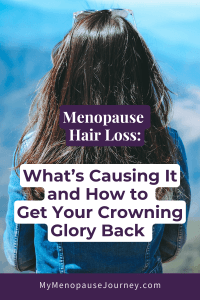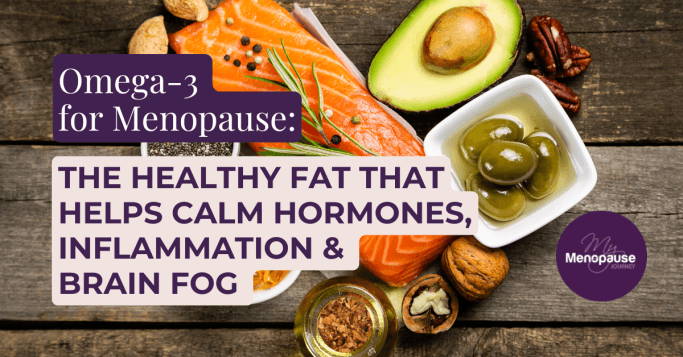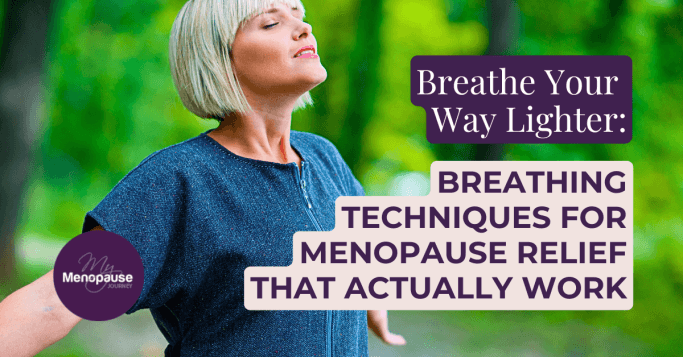You’re washing your hair, and there it is — a lot of it. In the drain, on the brush, tangled in your fingers.
At first, it’s just a few strands. Then one day your ponytail wraps tighter, and your part looks wider. You wonder: “Is this just part of the deal now?”
Menopause and hair loss is real. And no, being bothered by it is not just vanity — it can hit right at the core of how you feel about yourself.
I want you to hear this: You’re not overreacting. And you’re not the only one pulling stray hairs off your sweater and wondering what’s going on.
Hair isn’t just hair. It holds memories. Identity. “Crowning glory” as they call it.
So, when it starts to change, it can feel deeply personal. And confusing.
In this article, let’s talk about what’s really going on inside your body during menopause — and how you can care for your hair (and your hormones) in a way that feels doable and nourishing!


Hormonal Hair Loss in Menopause: Why It Happens
If your hair suddenly feels finer, flatter, or like it’s falling out faster than usual, hormonal hair loss during menopause is likely the culprit.
Your shifting hormone levels — especially estrogen, progesterone, and testosterone — are all directly involved in the health of your hair.
- Estrogen keeps hair in its growth phase longer.
- Progesterone blocks testosterone from becoming DHT (dihydrotestosterone) — which tend to shrink follicles.
- Testosterone, in high levels, may trigger more shedding and thinning.
You might see more hair on your pillow. Or a ponytail that feels like it’s missing half its old volume.
And yes, in some cases, you might spot wiry new growth in places you’d really rather not!
Hair Thinning in Menopause and the Thyroid Connection
When estrogen and progesterone shift, your thyroid health also often takes a hit. And when your thyroid slows down, everything else — including your hair — becomes affected, too.
Now, with low thyroid function (often triggered by hormonal imbalance), guess what else becomes sluggish? Your ability to absorb nutrients, build protein, and keep hair growing strong.
For your hair specifically, you might notice thinning, slower growth, shedding beyond normal and dry, dull texture.
This kind of female hair loss in midlife often comes with other symptoms — fatigue, bloating, brain fog… many sorts of signs that your body is asking for help.
Other Common Causes of Hair Loss During Perimenopause
While hormonal changes are a major player, hair loss during perimenopause can also be triggered or worsened by:
- Emotional or chronic stress (hello, cortisol overload)
- Crash dieting or nutrient gaps
- Exposure to toxins and chemical-rich products
- Inflammation and poor gut health
- Medications like antidepressants or hormone therapies
When it comes to menopause hair loss, it’s often not just one thing. It’s a stack.
That’s why you need a full-body, hormone-friendly strategy to see real improvement — and you’ll know about these remedies in the next section!
3 Natural Remedies for Menopause and Hair Loss
Natural remedies for hair loss won’t give you a 20-year-old’s glorious mane overnight — but they do help nourish your scalp, restore balance, and support healthier hair over time. This is where we focus on real care, not control!
Let’s start with what you’re feeding your follicles…
1. The Best Foods for Hair Growth in Menopause
Your hair craves nutrients — and seeing changes in your hair during midlife can reflect what your body is missing.
These foods are your hair’s favorite fuel:
- Pumpkin seeds – packed with zinc for hormonal balance
- Egg yolks and nutritional yeast – rich in biotin [https://mymenopausejourney.com/vitamin-b-complex/]
- Bone broth – for collagen + amino acids to strengthen strands
- Flax, chia and hemp seeds – for omega-3s and fiber
- Green tea – gentle DHT blocker and detoxifier
- Berries and citrus – vitamin C to support collagen production and reduce breakage
Ditching sugar, alcohol and processed foods also matters — they’re known to spike inflammation and worsen hormonal disruption!
2. Hair Supplements for Menopausal Hair Loss
If your meals are solid but you’re still noticing thinning, hair supplements for menopausal women can help fill in the gaps:
- Biotin + B5 – for thicker strands and adrenal support
- L-lysine – promotes healthy keratin production
- Zinc – helps regulate hormones and rebuild tissue
- Saw Palmetto, Pygeum – may reduce DHT impact on hair follicles
- Ashwagandha – soothes cortisol spikes and promotes relaxation
- Fish oil or pumpkin seed oil – for scalp inflammation and dryness
Always start small. Give your body time to adjust.
And track how you actually feel — not just how your hair looks.
Essential Oils That Help Hair Thinning in Women
Who said essential oils are just for aromatherapy?
These wonders of nature also offer a gentle, natural way to encourage scalp circulation and regrowth — especially when you feel too tired for anything complicated.
Some of your best options are:
- Rosemary – promotes thickness and new growth
- Peppermint – energizes the scalp
- Tea tree – clears buildup, reduces itchiness
Tip: Dilute in a carrier oil like jojoba or coconut and massage into the scalp.
A few minutes of this can feel really grounding — and therapeutic!
Hormone Balancing Tips for Better Hair Health
We’ve tackled natural remedies for hair loss, but if you’re really looking for a deep-rooted hormonal reset, let me show you the core work.
Supporting your hormonal foundation often does more for your hair than any serum or mask!
Try these gentle shifts:
- Eat plenty of good fats (olive oil, avocado, ghee)
- Move daily — walk, dance, stretch, strength training
- Sleep consistently (and keep your evenings relaxing!)
- Ditch endocrine disruptors in your skincare and home cleaning products
- Add adaptogens — like ashwagandha, Rhodiola, or holy basil
Remember, your hair isn’t separate from the rest of your body. What supports your hormonal health and overall well-being will support your strands, too!
5 Bonus Hair Care Tips for Thinning Hair in Menopause
Once your inside support is in place, let’s talk outside care. Here are some simple but effective hair thinning solutions for women in midlife:
- Use a biotin or keratin-based shampoo
- Wash less often, and with cooler water
- Let your hair air-dry whenever you can
- Avoid tight styles or aggressive brushing
- Sleep on silk sheets and pillowcases to reduce breakage and friction
And don’t forget… if you’re dealing with menopause and hair loss, your body is not betraying you — it’s communicating with you.
Slow down, listen to what it needs, and give it real nourishment. Support your hormones, feed your follicles, and in time you’ll see and feel the difference — stronger hair, steadier energy, and more confidence shining through.
FAQ: Menopause and Hair Loss
Why does menopause cause hair loss?
Menopause hair loss is mainly driven by changing hormones. Falling estrogen and progesterone shorten your hair’s growth phase, while higher DHT (from testosterone) can shrink follicles and trigger shedding.
Will hair grow back after menopause?
For some women, yes — especially if the cause is mostly hormonal or linked to stress, nutrition, or thyroid shifts. With the right support (diet, supplements, stress care), hair can regrow or at least thicken. For others, it may stabilize rather than fully return.
What is the best treatment for menopause and hair loss?
There’s no single fix, but the best approach combines nourishing foods, key nutrients (like biotin, zinc, omega-3s), stress reduction, and hormone support. Topical options like rosemary oil and gentle hair care routines also help.
What foods help hair loss in menopause?
Hair loves nutrient-rich foods such as pumpkin seeds, eggs, bone broth, flax, chia, hemp seeds, and berries. These provide protein, zinc, collagen, omega-3s, and antioxidants that strengthen strands from the inside out.
What vitamins help with menopause hair loss?
Biotin, B-complex, vitamin C, zinc, and omega-3s are all supportive. Supplements like saw palmetto or ashwagandha can also help by balancing hormones and stress.
Can stress make menopause hair loss worse?
Yes. High cortisol levels from chronic stress can push more hairs into the shedding phase and weaken regrowth. Relaxation, sleep, and adaptogens can help calm the stress–hair connection.
References:
pmc.ncbi.nlm.nih.gov/articles/PMC7432488/
pmc.ncbi.nlm.nih.gov/articles/PMC10669803/
womens-health-concern.org/wp-content/uploads/2022/12/16-WHC-FACTSHEET-MenopausalHairLoss-NOV2022-B.pdf
health.harvard.edu/staying-healthy/treating-female-pattern-hair-loss
my.clevelandclinic.org/health/diseases/16921-hair-loss-in-women


Gita is the founder of My Menopause Journey. Since 2014, she has been supporting midlife women by sharing hard-earned learnings from her own experience. To advance her knowledge, Gita puts a lot of her time and effort into understanding the broad spectrum of women’s health. She immerses in extensive research about the physical, mental and emotional aspects of menopause. Gita believes in the life-changing power of healthy, holistic living — this is where she anchors her message to all women. Learn more about her marvelous mission in About us - My Menopause Journey.






Mine is it horrible
I had that falling hair